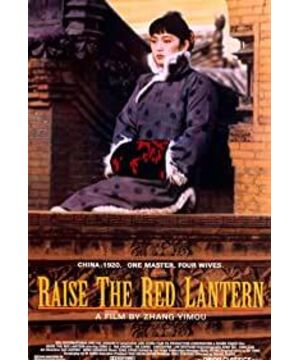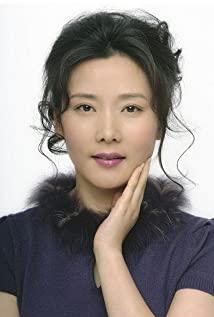of the original work of "Wives and Concubines" has not been specified, it is generally believed to be in Jiangsu and Zhejiang. And Zhang Yimou transplanted the story to the Qiao family compound in Shanxi. This migration changed many elements. According to the original description, the Chen family's yard is a "garden" with wisteria flowers and a lot of other plants, while the Qiao family's compound is bare, only bricks and tiles. The good thing is that the barren environment reflects the cold heart of Song Lian, which is more claustrophobic. However, the image of the "fighting" among the wives was also wiped out, and it seemed that the role of the environment was too strong, and there was no hope from the beginning. Comparatively speaking, the first half of "Wives and Concubines" is not dead yet. Another often discussed is the disappearance of the "well", which Zhang Yimou/Ni Zhen replaced with a hut on the city wall. This replacement was a huge failure. The associations that well give people are quite complicated. Its fluid and moist character is the backbone of the original's dense atmosphere. At the same time, it turned out to be a facility that people use every day, which especially strengthened the sense of horror. To die in a well is to go down, fall into silence, and fall asleep. And the hut hanging on the city wall is upward, shouting. In the novel, Songlian is always passing by the well, haunted by her own mysterious fantasies, and even involuntarily wants to jump in. And those subtle propulsions are gone after changing the settings. The gradual accumulation of these subtle differences has also resulted in a great difference in the temperament of the novel and the film.
plot censorship
The turning point of Song Lian's fate in "Wives and Concubines" is the grandfather's birthday. On her birthday, she first lost her temper and pretended not to be sick, then gave her an inappropriate gift, and finally kissed the master inappropriately. In the film, this point was changed to Songlian pretending to be pregnant to win the favor of the master. After being denounced by Yan'er, the master was furious. Song Lian also held a grudge against Yan'er. In fact, the original text also mentioned that Song Lian wanted to get pregnant but couldn't, and the old man became impotent a few months later. It can be said that the practice of false pregnancy is reasonable, and by the way, the line of Yan'er is also fluently explained. Because the film could not cover the plot length of the entire book, this adaptation was a very successful integration, but it also inevitably changed the character of Songlian. Judging from the original work, Song Lian was very dissatisfied with this old order. She wanted to resist, but had no plans. Therefore her actions are arbitrary, ineffective, and willful. She has the heart of a girl, so she is both childish and vicious. From the behavior in the film, Songlian seems to be very cunning, she understands how to use "fake pregnancy" to gain her own interests. And in this way it seems that Songlian has become the maintainer of the old order. The same can be inferred from her last actions. Songlian sat alone in the room, lit all the lanterns, and sat quietly in the red. The red lantern seemed to be an honor for Song Lian at this time. She is like a defeated general, quietly reminiscing about the glorious years in the curtain. In this tragic ritual there is a dangerous resignation. And this is not seen in the novel.
Another unfortunate part is that Fei Pu's role has been diluted. The relationship between Songlian and Feipu is a very important clue in the original work. It is Songlian's source of hope because she seems to see true love. It is also the source of Songlian's fear, because she sees the same ending as Meishan. And Feipu is also a very interesting character. He said he was afraid of women. After generations of patriarchal rule, Mr. Chen is the last generation, and Feipu is a nominal heir. However, just as this order was about to collapse, there were still people in the Chen residence who consciously maintained it. This is also the point of the original work.
other details
Gong Li's acting skills are beyond doubt, but her image is somewhat inappropriate. According to the original writing, Song Lian is a college student with short hair. As soon as they entered Chen's house, everyone clearly felt that she was different, that she was trendy and fashionable. But Gong Li had two braids when she entered the door, and then she pulled her hair back like other wives. In terms of image, there is no gap with other wives, and it seems that he is naturally wedged into this rotten system.
Zhang Yimou deliberately blurred Mr. Chen's face in the film, and all the pictures he appeared were shot in a long-range panoramic view, or arranged for him to appear on the side. This seems to accentuate the image of an "absent ruler". This is quite in line with Su Tong's original intention. But after all, Mr. Chen's role in the film is very heavy, and this arrangement has interrupted the flow of the shots many times, leaving many cracks. This method itself has attracted too much attention, and it seems that some of the gains outweigh the losses.
View more about Raise the Red Lantern reviews











